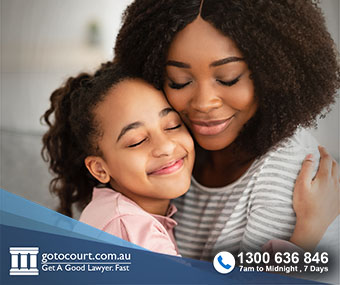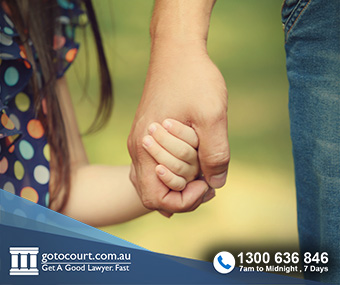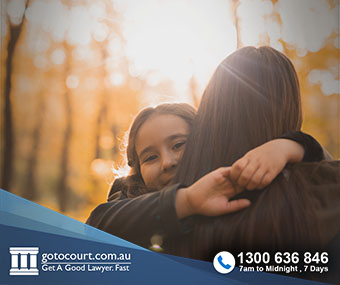Call our lawyers
now
or,
have our lawyers
call you
‘No Access’ Parenting Orders
Updated on Nov 02, 2022 • 6 min read • 837 views • Copy Link
‘No Access’ Parenting Orders
It is a well-established principal of family law that children have a right to a meaningful relationship with both parents. Courts achieve this in a number of different ways. Orders are often made for parents to share the care of children on a 50/50, week-about basis; children may be ordered to live with one parent while the other has weekend and holiday time; or in some cases the children may live with one parent while the other has only supervised contact. But what if one of the parents poses an unacceptable risk to the children? Can you get a ‘no access’ order?
If a parent has a history of violence, alcohol, drug or mental health issues, these may manifest in a way that makes that parent an entirely unsuitable person to have contact with a child. In a case like this, the other parent may apply for parenting orders giving him or her sole parental responsibility. They may also seek an order that the children should have no contact with the other parent. Courts will make orders that a parent have no access only if they are convinced that this is in the best interests of the children.
Best interests of the child
The paramount consideration in determining what parenting orders to make is what is in the best interests of the child (Family Law Act, Section 60CA). The main two considerations that the court has regard to in determining what is in a child’s best interests are
- The child’s right to have a meaningful relationship with both parents;
- The child’s right to be protected from harm, abuse, neglect or family violence.
The second of these considerations is to be given greater weight than the first. A range of factors will be considered in deciding how to balance the two, including:
- The child’s views (in accordance with the age and maturity of the child);
- The relationship the child has with each parent;
- What each parent has done to maintain the child;
- The capacity of each parent to provide for the child;
- The attitude to the child of each parent;
- Any family violence in the family;
Unacceptable risk
Judges in parenting cases are required to ‘give real and substantial consideration to the facts of the case, and to decide whether or not, and why or why not, those facts could be said to raise an unacceptable risk of harm to the child’ (Justice Fogarty, in N & S & The Separate Representative (1996) FLC 92-655).
If the court considers that a parent poses an ‘unacceptable risk’ to the child, it may make an order that the children have no contact with this parent. However, the fact that a parent has a history of domestic violence, abuses drugs or alcohol or is mentally ill is not necessarily sufficient for a court to find that they pose an unacceptable risk. The court will look at all the circumstances and make a determination as to what is in the child’s best interests, balancing the benefit of a meaningful relationship with both parents with the need to be protected from harm.
Where there are concerns about a parent’s lifestyle, drug use or associates, courts will often make orders that the children have contact with them only under certain conditions.
These may include:
- That the parent continue to return negative drugs tests;
- That the parent does not consume alcohol in the presence of the child;
- That the child not be exposed to one or more specific people;
- That the child not be exposed to domestic violence;
- That the contact is to be supervised by a designated third person, such as a grandparent.
In circumstances where conditions like these can alleviate concerns about a parent’s lifestyle, they are generally considered preferable to a no access order.
No access where parent not engaged with the child
The fact that a parent has never engaged with a child and that the child has no attachment to them is generally not sufficient to obtain a no access order. The courts take the view that there is always the potential to establish a relationship between a child and a parent and that the child stands to benefit from such a relationship. This is particularly the case when the child is still in his or her early childhood. While the fact that a parent has not previously been involved in a child’s life may be sufficient to obtain orders that that parent should not be the primary carer, it will not usually be enough to get an order that they have no access.
No access where access is not in the child’s best interests
Circumstances in which it may be possible to get a ‘no access’ order where a parent does not pose an unacceptable risk to the child are generally limited to:
- Where there is compelling evidence from a psychologist or psychiatrist that establishing contact between the child and the parent is likely to cause significant trauma, anxiety or depression to the child;
- Where there is compelling evidence from a psychologist or psychiatrist that establishing contact between the child and the parent is likely to cause significant trauma, anxiety or depression to the parent who is the primary carer;
- Where the child is aged ten or older and has expressed strong wishes not to have contact with the parent.
West v West 2015
An instructive example of a case where the court ordered no access between the children and the father is the 2015 case of West v West.
The father of three children applied for parenting orders for equal shared parental responsibility and 50/50 shared care of the children to himself and the mother. The mother opposed his application and succeeded in obtaining sole parental responsibility and an order restraining the father from communicating with the children or having any contact with them. The Independent Children’s Lawyer supported orders that the children have no contact with the father.
The father suffered from a paranoid psychotic disorder, had been a long-term abuser of marijuana and had a history of violent offending. He had been violent towards the mother, though the parties disputed the details of the violence. After the parents separated, the father abducted one of the children during a visit at a playground. He later commenced making accusation against the mother, including that she practiced witchcraft, and proceeded to make threats and accusations against the government and various social groups. The father presented as menacing throughout the court hearing and was abusive towards witnesses, lawyers and the judge. He stated that he was a prophet from God chosen to be a spokesperson against the government and in particular, the Family Court.
The court found that the children could not benefit from a relationship with such a father and that he posed an unacceptable risk of physical and psychological harm to them.
If you need legal advice or representation in a family law matter, please contact Go To Court Lawyers.

Affordable Lawyers
Our Go To Court Lawyers will assist you in all areas of law. We specialise in providing legal advice urgently – at the time when you need it most. If you need a lawyer right now, today, we can help you – no matter where you are in Australia.How It Works







1. You speak directly to a lawyer
When you call the Go To Court Legal Hotline, you will be connected directly to a lawyer, every time.


2. Get your legal situation assessed
We determine the best way forward in your legal matter, free of charge. If you want to go ahead and book a face-to-face appointment, we will connect you with a specialist in your local area.


3. We arrange everything as needed
If you want to go ahead and book a fact-to-face appointment, we will connect you with a specialist in your local area no matter where you are and even at very short notice.













